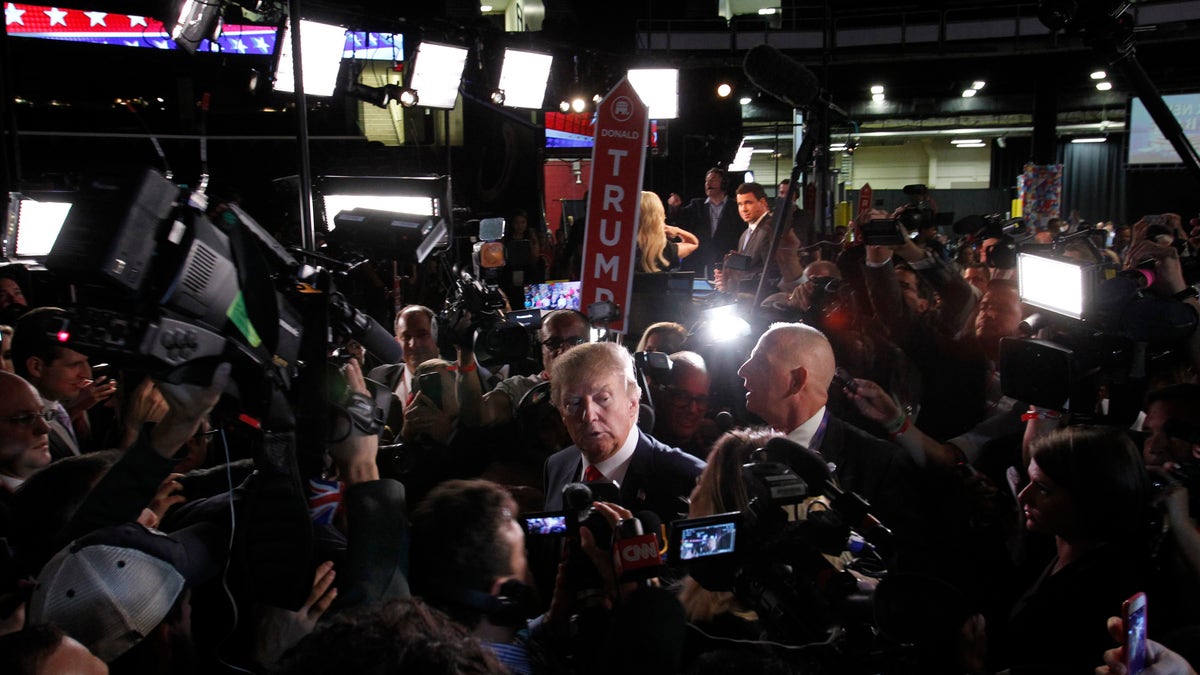
Republican 2016 U.S. presidential candidate businessman Donald Trump is surrounded by news media in the "spin room" after the conclusion of the first official Republican presidential candidates debate of the 2016 U.S. presidential campaign in Cleveland, Ohio, August 6, 2015. (REUTERS/Aaron Josefczyk)
I’ve been thinking about Donald Trump – or trying to. You might have noticed that unless Mr Trump is shouting at us from behind a forest of microphones, dressed in one of his ill-fitting suits, preening and grimacing and mugging Mussolini-like, wagging his under-sized finger, or sometimes making his finger into a pistol and pointing it at his own orange noggin, or cursing at some heckler out in one of his diminishing audiences – that unless we have Mr Trump’s iridescence squarely in front of us, it’s actually hard to keep him in mind.
Which is odd, for such an out-sized individual who seems to want to win the US presidency on the argument that what you see is what you get – the cliché he hopes will translate into a case for his authenticity. Indeed, Mr Trump – who, I believe, is an actual human – seems strangely insubstantial. Here, it should be said, I’m leaving aside all his smoke ’n’ mirrors, hoo-doo “positions” and “policies” and blustery implausible “intentions” for what he’d “do” if he were elected to what Andrew Jackson once called “the first office in the world” (it may not quite be that anymore). I’m really just remarking on his personal affect. Watching Donald Trump, with all the gaudy hair and mortician’s tan and noisy, bludgeoning comportment reminds me of staring into a cheap kaleidoscope, wherein we can see one not-quite-bizarre, not-quite-interesting, not-quite-memorable, not-quite-distinct mandala after another. Thinking about Mr Trump, trying to fix on the there that’s supposedly there, is like wanting to figure out what basic design a kaleidoscope really contains down there inside its hollow paper tube. There isn’t one.
It might seem unfair (it might be unfair, since I’ve never met Mr Trump) to appraise him in this way. Of course, most of the indices we use to estimate and choose our presidents in the United States are hopelessly impressionistic and insecure. We wouldn’t choose a person to mow the grass behind our house on such a pitiful amount of hard, supporting evidence. First of all, we’d insist on references. After that, we’d require to know that the applicant could fully identify a lawnmower, then show some aptitude for using it. Presidents we let off more easily.
To get candidate Trump into better focus and measure his “actuality”, I’ve tried to think of some regular everyday activities I might seek to share with him – in essence match him against myself, since I’m still fairly actual. For starters, I’m sure that I could not have dinner alone with Mr Trump in my favourite restaurant in Paris. He’d ruin it. I’m also sure I couldn’t go fishing with him on a backwoods lake in Maine. Same reason. I’m sure I couldn’t explain to him and have him be interested in the anxiety-producing aspects of my saliva gland surgery (or my divorce – if I’d ever had one). I’m sure I couldn’t discuss with him a great novel I’d just read. He would’ve read something better – probably something he “wrote”. I’m sure I couldn’t go to most movies with him: he’d talk non-stop. In all these activities – things I could engage in with pretty much any stranger – Mr Trump and I would have nothing to say to each other. Nothing mutual. And the result could be spiritually wounding for me. I’m not sure why this seems important, but it does.
To continue reading Richard Ford's personal essay in The Times Literary Supplement, click here.








































